9 interesting facts about Antarctica
Why the heck would you head to Antarctica? Most of us get our fill of snow and ice at home, thank you very much. Isnt that all there is to see around the South Pole? As it turns out, not even close. Antarctica and the nearby islands are part of an amazingly vital ecosystem that supports everything from teeny tiny krill right up to those gentle giants, the blue whales. Add on the exploration of history, challenging physical activities, and some staggering beautiful landscapes, and youve got yourself the makings of a luxurious adventure. In this list well take a look at just the tip of the iceberg of facts that may interest you about our southern-most continent.
 1. Its the largest desert in the world
Deserts are defined by the amount of precipitation that falls within one year. To be specific, a region has to receive less than 250 mm (approx. ten inches) inside of twelve months. That means that about one third of the Earths entire surface area is desert, with the Antarctic (14,000,000 km2) being the largest single desert region. (For comparison, the largest non-polar desert is the Sahara which covers about 9,000,000 km2.)
1. Its the largest desert in the world
Deserts are defined by the amount of precipitation that falls within one year. To be specific, a region has to receive less than 250 mm (approx. ten inches) inside of twelve months. That means that about one third of the Earths entire surface area is desert, with the Antarctic (14,000,000 km2) being the largest single desert region. (For comparison, the largest non-polar desert is the Sahara which covers about 9,000,000 km2.)
 2. It holds an amazing amount of one of our most precious resources
Water, that is. Antarctica holds about 90% of Earths freshwater. This resource and availability is so important that there has been talk of farming Antarctic-born icebergs, towing them to areas of the world that lack enough fresh water resources of their own. And not only is fresh water plentiful around Antarctica, its also incredibly clean. Munch on an Antarctic icicle and youll taste some of the freshest water on the planet.
2. It holds an amazing amount of one of our most precious resources
Water, that is. Antarctica holds about 90% of Earths freshwater. This resource and availability is so important that there has been talk of farming Antarctic-born icebergs, towing them to areas of the world that lack enough fresh water resources of their own. And not only is fresh water plentiful around Antarctica, its also incredibly clean. Munch on an Antarctic icicle and youll taste some of the freshest water on the planet.
 3. Its kind of like Mars
The dry and cold conditions of Antarctica make it one of the most Mars-like spots on Earth. In fact, NASA did some of their Viking mission tests in Antarcticas Dry Valleys region back in the 70s. So if youve ever fancied being one of Mars earliest settlers, you can take a practice run in Antarctica to see if its really your cup of tea.
3. Its kind of like Mars
The dry and cold conditions of Antarctica make it one of the most Mars-like spots on Earth. In fact, NASA did some of their Viking mission tests in Antarcticas Dry Valleys region back in the 70s. So if youve ever fancied being one of Mars earliest settlers, you can take a practice run in Antarctica to see if its really your cup of tea.
 4. You may be warmer in Antarctica
While the actual South Pole remains harshly cold the year round, the coasts in summer (where and when you probably will be visiting) can actually be downright spring-like. For example, the highest temperature recorded on the Antarctic Peninsula was 15°C (59°F), but generally you can expect temperatures to hover right around the freezing mark. So if youre coming from an icy northern winter, you could be watching the mercury rise as you sail south.
4. You may be warmer in Antarctica
While the actual South Pole remains harshly cold the year round, the coasts in summer (where and when you probably will be visiting) can actually be downright spring-like. For example, the highest temperature recorded on the Antarctic Peninsula was 15°C (59°F), but generally you can expect temperatures to hover right around the freezing mark. So if youre coming from an icy northern winter, you could be watching the mercury rise as you sail south.
 5. There are no countries in Antarctica
Not officially, anyway, although some countries have tried to claim certain regions of the continent over the years. Nowadays the entirety of Antarctica is governed by multiple countries via the Antarctica Treaty. For the luxury traveller that means that no visa is needed for Antarctica itself; however the treaty countries require visitors to have official permission (which you can usually get through your cruise line operators).
5. There are no countries in Antarctica
Not officially, anyway, although some countries have tried to claim certain regions of the continent over the years. Nowadays the entirety of Antarctica is governed by multiple countries via the Antarctica Treaty. For the luxury traveller that means that no visa is needed for Antarctica itself; however the treaty countries require visitors to have official permission (which you can usually get through your cruise line operators).
 6. It took thousands of years to actually reach the continent
People have been speculating about the existence of something down at our South Pole since antiquity. Back then, the theoretical land was known as Terra Australis (meaning South Land), and was dreamed up mainly as a way to balance out the known bits of the Arctic. The term Antarctica first pops up in the 2nd century AD, first used by Marinus of Tyre, a Greek mathematician, geographer, and cartographer. Whipping up a theoretical continent and actually reaching the thing were two different matters though. It wasnt until 1820 that expeditions first started making claims to having seen the actual continent itself.
6. It took thousands of years to actually reach the continent
People have been speculating about the existence of something down at our South Pole since antiquity. Back then, the theoretical land was known as Terra Australis (meaning South Land), and was dreamed up mainly as a way to balance out the known bits of the Arctic. The term Antarctica first pops up in the 2nd century AD, first used by Marinus of Tyre, a Greek mathematician, geographer, and cartographer. Whipping up a theoretical continent and actually reaching the thing were two different matters though. It wasnt until 1820 that expeditions first started making claims to having seen the actual continent itself.
 7. It has one of the worlds only long-lived lava lakes
The most southern active volcano in the world, Mount Erebus, calls Antarctica home. Scientists love it because while its active, its consistently mellow (for a volcano, that is) making it easier to study than more aggressive examples. Its remoteness away from human and animal activity makes it a sweet spot to study oligotrophs fungi and bacteria that survive on minimal resources much like those that may exist on other planets.
7. It has one of the worlds only long-lived lava lakes
The most southern active volcano in the world, Mount Erebus, calls Antarctica home. Scientists love it because while its active, its consistently mellow (for a volcano, that is) making it easier to study than more aggressive examples. Its remoteness away from human and animal activity makes it a sweet spot to study oligotrophs fungi and bacteria that survive on minimal resources much like those that may exist on other planets.
 8. Antarctica has all of the time zones in the world
or none at all
Because of its position on the bottom of the globe Antarctica has a portion of every single time zone (as long as you dont get too technical about small regions that have adopted their own way of dealing with time zones).
8. Antarctica has all of the time zones in the world
or none at all
Because of its position on the bottom of the globe Antarctica has a portion of every single time zone (as long as you dont get too technical about small regions that have adopted their own way of dealing with time zones).
 However, time zones are kind of useless in Antarctica because of its months-long winters and summers which result in near 24-hour runs of darkness or sunshine. So when you hit the shores its kind of up to you as to what time it is
which means it might be cocktail hour every waking moment of the day.
9. Only 2 penguin species live on the continent the year round
There are about 17 sub-species of penguin (the exact number depends on the scientist you ask to do the specifications), and millions of the funny little birds spread out around the southern hemisphere. Yet out of all those numbers, only two, the Emperor and the Adélie Penguins, make the continent their home the year round.
However, time zones are kind of useless in Antarctica because of its months-long winters and summers which result in near 24-hour runs of darkness or sunshine. So when you hit the shores its kind of up to you as to what time it is
which means it might be cocktail hour every waking moment of the day.
9. Only 2 penguin species live on the continent the year round
There are about 17 sub-species of penguin (the exact number depends on the scientist you ask to do the specifications), and millions of the funny little birds spread out around the southern hemisphere. Yet out of all those numbers, only two, the Emperor and the Adélie Penguins, make the continent their home the year round.
 As for the rest, some pop onto the continent to enjoy each others company only during the mating season, while the rest live on the surrounding islands, New Zealand, and the coasts of South America.
Matt Schwachofer is the Online Marketing Manager at Oceanwide Expeditions.
If you would like to be a guest blogger on A Luxury Travel Blog in order to raise your profile, please contact us.
As for the rest, some pop onto the continent to enjoy each others company only during the mating season, while the rest live on the surrounding islands, New Zealand, and the coasts of South America.
Matt Schwachofer is the Online Marketing Manager at Oceanwide Expeditions.
If you would like to be a guest blogger on A Luxury Travel Blog in order to raise your profile, please contact us.
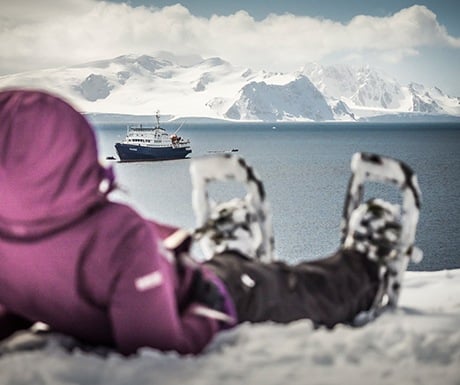 1. Its the largest desert in the world
Deserts are defined by the amount of precipitation that falls within one year. To be specific, a region has to receive less than 250 mm (approx. ten inches) inside of twelve months. That means that about one third of the Earths entire surface area is desert, with the Antarctic (14,000,000 km2) being the largest single desert region. (For comparison, the largest non-polar desert is the Sahara which covers about 9,000,000 km2.)
1. Its the largest desert in the world
Deserts are defined by the amount of precipitation that falls within one year. To be specific, a region has to receive less than 250 mm (approx. ten inches) inside of twelve months. That means that about one third of the Earths entire surface area is desert, with the Antarctic (14,000,000 km2) being the largest single desert region. (For comparison, the largest non-polar desert is the Sahara which covers about 9,000,000 km2.)
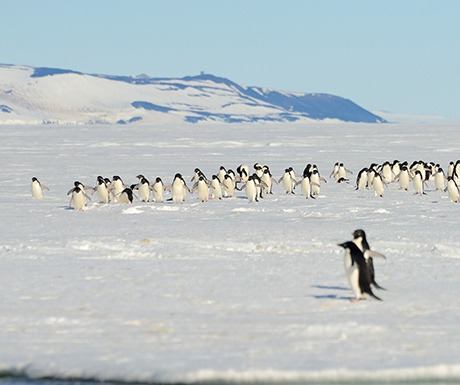 2. It holds an amazing amount of one of our most precious resources
Water, that is. Antarctica holds about 90% of Earths freshwater. This resource and availability is so important that there has been talk of farming Antarctic-born icebergs, towing them to areas of the world that lack enough fresh water resources of their own. And not only is fresh water plentiful around Antarctica, its also incredibly clean. Munch on an Antarctic icicle and youll taste some of the freshest water on the planet.
2. It holds an amazing amount of one of our most precious resources
Water, that is. Antarctica holds about 90% of Earths freshwater. This resource and availability is so important that there has been talk of farming Antarctic-born icebergs, towing them to areas of the world that lack enough fresh water resources of their own. And not only is fresh water plentiful around Antarctica, its also incredibly clean. Munch on an Antarctic icicle and youll taste some of the freshest water on the planet.
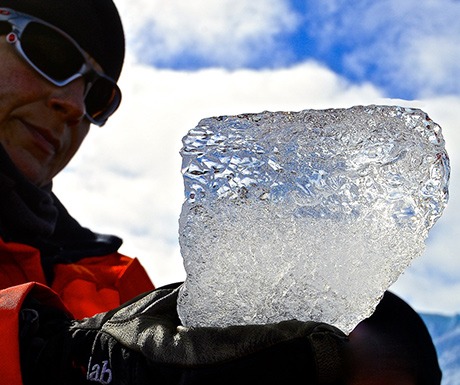 3. Its kind of like Mars
The dry and cold conditions of Antarctica make it one of the most Mars-like spots on Earth. In fact, NASA did some of their Viking mission tests in Antarcticas Dry Valleys region back in the 70s. So if youve ever fancied being one of Mars earliest settlers, you can take a practice run in Antarctica to see if its really your cup of tea.
3. Its kind of like Mars
The dry and cold conditions of Antarctica make it one of the most Mars-like spots on Earth. In fact, NASA did some of their Viking mission tests in Antarcticas Dry Valleys region back in the 70s. So if youve ever fancied being one of Mars earliest settlers, you can take a practice run in Antarctica to see if its really your cup of tea.
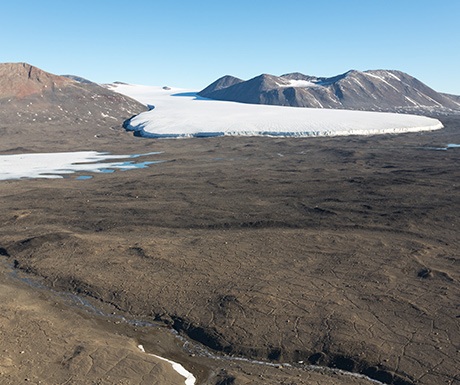 4. You may be warmer in Antarctica
While the actual South Pole remains harshly cold the year round, the coasts in summer (where and when you probably will be visiting) can actually be downright spring-like. For example, the highest temperature recorded on the Antarctic Peninsula was 15°C (59°F), but generally you can expect temperatures to hover right around the freezing mark. So if youre coming from an icy northern winter, you could be watching the mercury rise as you sail south.
4. You may be warmer in Antarctica
While the actual South Pole remains harshly cold the year round, the coasts in summer (where and when you probably will be visiting) can actually be downright spring-like. For example, the highest temperature recorded on the Antarctic Peninsula was 15°C (59°F), but generally you can expect temperatures to hover right around the freezing mark. So if youre coming from an icy northern winter, you could be watching the mercury rise as you sail south.
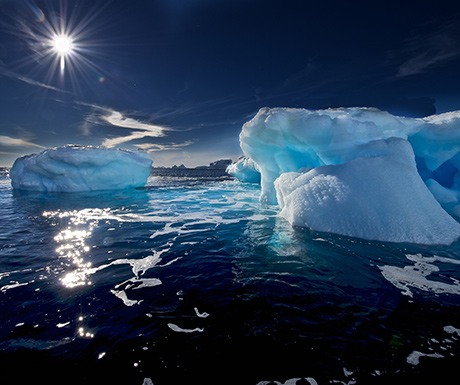 5. There are no countries in Antarctica
Not officially, anyway, although some countries have tried to claim certain regions of the continent over the years. Nowadays the entirety of Antarctica is governed by multiple countries via the Antarctica Treaty. For the luxury traveller that means that no visa is needed for Antarctica itself; however the treaty countries require visitors to have official permission (which you can usually get through your cruise line operators).
5. There are no countries in Antarctica
Not officially, anyway, although some countries have tried to claim certain regions of the continent over the years. Nowadays the entirety of Antarctica is governed by multiple countries via the Antarctica Treaty. For the luxury traveller that means that no visa is needed for Antarctica itself; however the treaty countries require visitors to have official permission (which you can usually get through your cruise line operators).
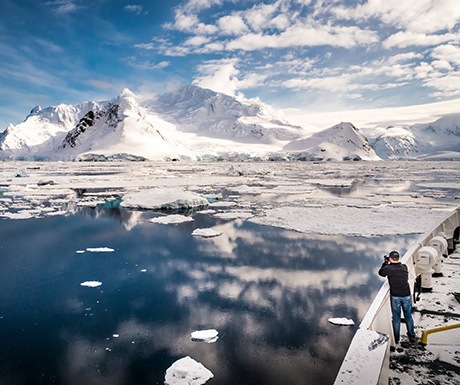 6. It took thousands of years to actually reach the continent
People have been speculating about the existence of something down at our South Pole since antiquity. Back then, the theoretical land was known as Terra Australis (meaning South Land), and was dreamed up mainly as a way to balance out the known bits of the Arctic. The term Antarctica first pops up in the 2nd century AD, first used by Marinus of Tyre, a Greek mathematician, geographer, and cartographer. Whipping up a theoretical continent and actually reaching the thing were two different matters though. It wasnt until 1820 that expeditions first started making claims to having seen the actual continent itself.
6. It took thousands of years to actually reach the continent
People have been speculating about the existence of something down at our South Pole since antiquity. Back then, the theoretical land was known as Terra Australis (meaning South Land), and was dreamed up mainly as a way to balance out the known bits of the Arctic. The term Antarctica first pops up in the 2nd century AD, first used by Marinus of Tyre, a Greek mathematician, geographer, and cartographer. Whipping up a theoretical continent and actually reaching the thing were two different matters though. It wasnt until 1820 that expeditions first started making claims to having seen the actual continent itself.
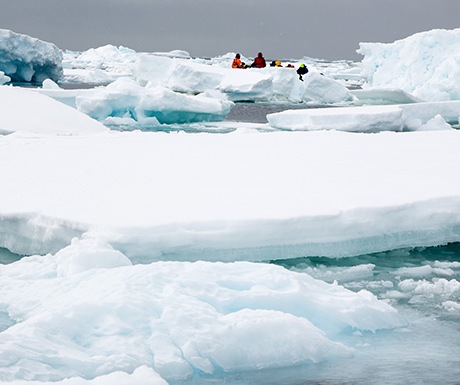 7. It has one of the worlds only long-lived lava lakes
The most southern active volcano in the world, Mount Erebus, calls Antarctica home. Scientists love it because while its active, its consistently mellow (for a volcano, that is) making it easier to study than more aggressive examples. Its remoteness away from human and animal activity makes it a sweet spot to study oligotrophs fungi and bacteria that survive on minimal resources much like those that may exist on other planets.
7. It has one of the worlds only long-lived lava lakes
The most southern active volcano in the world, Mount Erebus, calls Antarctica home. Scientists love it because while its active, its consistently mellow (for a volcano, that is) making it easier to study than more aggressive examples. Its remoteness away from human and animal activity makes it a sweet spot to study oligotrophs fungi and bacteria that survive on minimal resources much like those that may exist on other planets.
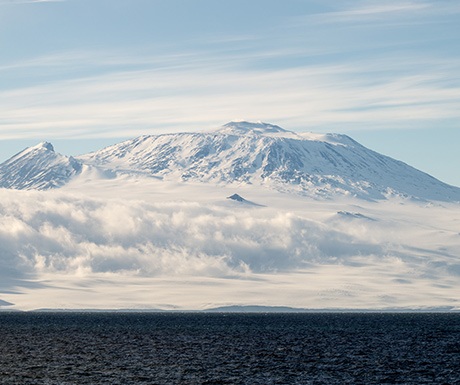 8. Antarctica has all of the time zones in the world
or none at all
Because of its position on the bottom of the globe Antarctica has a portion of every single time zone (as long as you dont get too technical about small regions that have adopted their own way of dealing with time zones).
8. Antarctica has all of the time zones in the world
or none at all
Because of its position on the bottom of the globe Antarctica has a portion of every single time zone (as long as you dont get too technical about small regions that have adopted their own way of dealing with time zones).
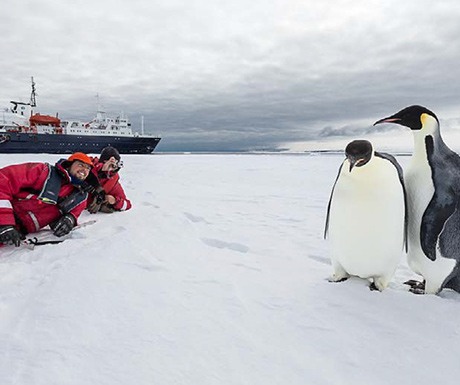 However, time zones are kind of useless in Antarctica because of its months-long winters and summers which result in near 24-hour runs of darkness or sunshine. So when you hit the shores its kind of up to you as to what time it is
which means it might be cocktail hour every waking moment of the day.
9. Only 2 penguin species live on the continent the year round
There are about 17 sub-species of penguin (the exact number depends on the scientist you ask to do the specifications), and millions of the funny little birds spread out around the southern hemisphere. Yet out of all those numbers, only two, the Emperor and the Adélie Penguins, make the continent their home the year round.
However, time zones are kind of useless in Antarctica because of its months-long winters and summers which result in near 24-hour runs of darkness or sunshine. So when you hit the shores its kind of up to you as to what time it is
which means it might be cocktail hour every waking moment of the day.
9. Only 2 penguin species live on the continent the year round
There are about 17 sub-species of penguin (the exact number depends on the scientist you ask to do the specifications), and millions of the funny little birds spread out around the southern hemisphere. Yet out of all those numbers, only two, the Emperor and the Adélie Penguins, make the continent their home the year round.
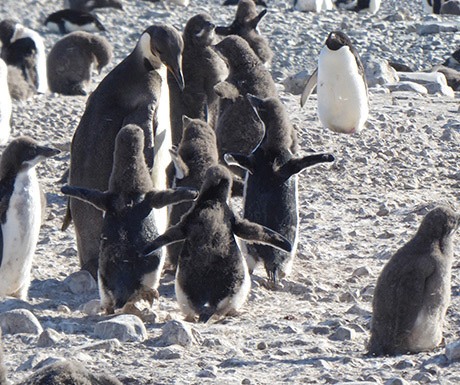 As for the rest, some pop onto the continent to enjoy each others company only during the mating season, while the rest live on the surrounding islands, New Zealand, and the coasts of South America.
Matt Schwachofer is the Online Marketing Manager at Oceanwide Expeditions.
If you would like to be a guest blogger on A Luxury Travel Blog in order to raise your profile, please contact us.
As for the rest, some pop onto the continent to enjoy each others company only during the mating season, while the rest live on the surrounding islands, New Zealand, and the coasts of South America.
Matt Schwachofer is the Online Marketing Manager at Oceanwide Expeditions.
If you would like to be a guest blogger on A Luxury Travel Blog in order to raise your profile, please contact us.Did you enjoy this article?
Receive similar content direct to your inbox.

